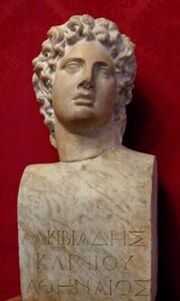| ||||||||||||||||||||||||||||||||||||
Alcibiades Cleiniou Scambonides (Greek: Ἀλκιβιάδης Κλεινίου Σκαμβωνίδης, transliterated Alkibiádēs Kleiníou Skambōnidēs c. 450–404 BC), was a prominent Athenian statesman, orator, and general. He played a major role in the second half of the Peloponnesian War as a strategic advisor, military commander, and politician.
During the course of the Peloponnesian War, Alcibiades changed his political allegiance on several occasions. In his native Athens in the early 410s BC, he advocated an aggressive foreign policy, and was a prominent proponent of the Sicilian Expedition, but fled to Sparta after his political enemies brought charges of sacrilege against him. In Sparta, he served as a strategic adviser, proposing or supervising several major campaigns against Athens. Alcibiades soon made powerful enemies in Sparta and was forced to defect to Persia. He remained until his Athenian political allies brought about his recall. He then served as an Athenian General (Strategos) for several years, but his enemies eventually succeeded in exiling him a second time.
Alcibiades eventually found himself leading Athens again. The circumstances of his death are unclear, but he appears to have been killed in battle.
Alcibiades in Ruled Britannia
Alcibiades was a play by William Shakespeare. As he sought to arrest John Walsh by stealth, Lope de Vega thought of a line from this play: "The better part of valour is discretion."[1]
Literary comment
In OTL Shakespearean plays, Alcibiades is a major supporting character in Timon of Athens. The "valour" line is from the character Sir John Falstaff in Henry IV Part I.
Alcibiades in "The Daimon"
Alkibiades had already established a formidable political career when, in 415 BC, he agreed to lead an expedition to Sicily despite accusations that he and his followers had desecrated hermai throughout the plois.[2] His absence emboldened his enemies, and they began to accuse him of other sacrilegious actions and comments and even alleged that these actions were connected with a plot against the democracy. After the expedition took Katane, the state trireme Salaminia arrived, led by Herakleides, with orders to bring Alkibiades and the others indicted for mutilating the hermai or profaning the Eleusinian Mysteries back to Athens to stand trial.[3]
Alkibiades put off Herakleides, and sought council with Sokrates, the noted thinker and Alkibiades' former mentor, who had joined the expedition. After some discussion, Alkibiades decided to press his attack on Syracuse,[4] and then move against Sparta itself.[5] He also skillfully manipulated his troops, calling them the "people of Athens", gaining their support through his charismatic speech, and then through his military success. His forces successfully invaded Syracuse, placing a puppet regime in control of the city. Sparta was raided and razed, and its king, Agis became a junior partner in a new alliance with Athens.[6]
Nonetheless, when the expedition returned to Athens, Alkibiades was still expected to stand trial. His soldiers were not allowed to enter the city armed. Only Sokrates gladly entered the city without his arms. Realizing that not everyone who guarded the city was his enemy, Alkibiades made contact with supporters among the guards, and entered the city at night with a detachment of troops. They quickly took the Akropolis. Alkibiades was pleased to personally capture Androkles and Thettalos, the men most responsible for his troubles.[7]
Immediately, Alkibiades set about consolidating his power and quashing dissidence. Among those who fell to victim to Alkibiades rule were Kritias, Aristokles, and Sokrates himself. Each had in turn denounced Alkibiades. Sokrates was arrested late in the night and brought before Alkibiades, who demanded Sokrates drink hemlock. Instead, Sokrates attacked and attempted to kill Alkibiades. The dictator's guards stabbed Sokrates to death.[8]
His control of Athens complete, Alkibiades convinced Spartan king Agis to launch a war on their mutual enemy, Persia. Privately, however, Alkibiades envisioned a day when he alone would be atop the civilized world, ruling an empire that stretched from Sicily to India, and that the ultimate establishment of this empire was why Sokrates' daimon convinced him to join Alkibiades in Sicily in the first place.[9]
See Also
- Julius Caesar, a Roman potentate whose historical rise to power is broadly echoed by Alkibiades' fictional one in "The Daimon".
- Alexander the Great, whose OTL empire serves as a model for the one Alkibiades is contemplating at the end of "The Daimon".
References
| Political offices (Fictional Work) | ||
|---|---|---|
| Preceded by Arimnestus as Archon |
Tyrant of Athens ("The Daimon") 415 BC - |
Succeeded by Incumbent at story's end |
| |||||||||||
| |||||||||||||||||||

